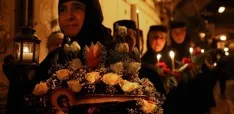Female Monastic Life in Greek Orthodoxy, Theravada Buddhism and Soto Zen: A Comparative Study

Dina Zingaro '13 was awarded a Eugene Lang Summer Initiative Grant for Honors research on the lives of Buddhist and Greek Orthodox Christian nuns.
The text that follows is from her project proposal.
In Women Under the Bo Tree, in her study of Buddhist nuns in Sri Lanka, Tessa Bartholomeusz writes that there is a "claim that is it more important for women to support Buddhism by cultivating their roles as laywomen and nurturers"[i]. Keeping in mind this assertion of male facilitation in the roles and power delegated to women of faith, this project in the field of Comparative Religion will explore and possibly challenge this perception of women as simply dominated or repressed by men by considering how, as Caroline Walker Bynum puts it, "marginal and disadvantaged groups in a society appropriate that society's dominant symbols and ideas in ways that revise and undercut them"[ii].

This research will study female monastic life within the Greek Orthodox, Theravada Buddhist and Soto Zen traditions and will be completed at three monastic communities: Aranya Bodhi Forest Hermitage in Jenner, CA, which is the only forest hermitage for Theravadin bhikkhunis (fully ordained female Buddhist monastics) in the US; Shasta Abbey, a Buddhist monastery in the Soto Zen tradition in Mount Shasta, CA; and the Greek Orthodox Timios Stavros Monastery in Corinth, Greece. This study will ask if and how religious women - often the marginal and disadvantaged group - wield power even within these male-dominated hierarchies. It also will examine the kinds of religious authority that women have in these religious communities and the social meaning of their religious expression and practice in the world outside of the monasteries.
The project will also explore the ways in which the use of ritual and imagery in sacred space cultivate kinship between women in these communities, specifically the use of iconography in the Greek Orthodox tradition. Finally, it will investigate the reasons for why there seems to be a greater discourse surrounding Theravadin ordination for nuns posing challenges to normative gender structures, whereas Greek Orthodoxy lacks this type of dialogue for females role with clerical positions. This project will provide an opportunity to identify the shared threads of female spirituality, specifically power, its possibilities and in what ways it is limited and/or cultivated through ritual, sacred space, and imagery.



